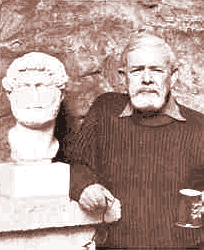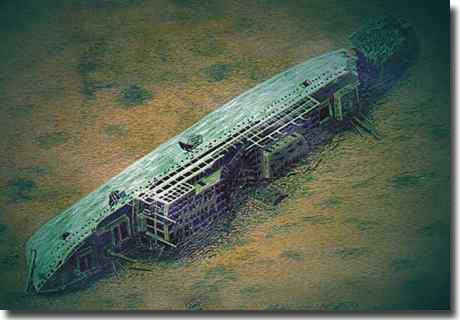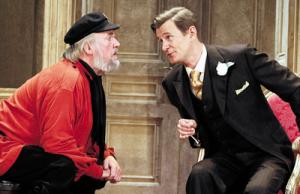 I was reminded yesterday, writing about the eccentricities of booksellers in general, and of those in the business of used books in particular, of one of the more unusual characters with whom I've ever worked.
I was reminded yesterday, writing about the eccentricities of booksellers in general, and of those in the business of used books in particular, of one of the more unusual characters with whom I've ever worked.It was in a little used bookshop, for example, other than the one I mentioned yesterday, that I worked with a man who was very proud of his family. This man -- call him "Z" -- had lost much by the time I knew him, but not his confidence in his own blood. No longer young, but not so old as he looked, he was nevertheless a person of unusual appearance. His standard costume was an undershirt and jeans, though like me, he wore every day an apron at work. His daily ablutions seemed always to have been accomplished but briefly before he came in, as his long thin hair looked perpetually wet, his chin imperfectly shaved, and his expression, harried. He had some excuse for this disinterest in appearances. He'd lost a part of his jaw to cancer, and his palate as well, and the treatment, he explained, had wrecked all his remaining teeth. His smile, though rare, was not then an easy thing to look at. He wore an elaborate bridge in his mouth, wired to some surviving tooth, and had a separate plate, screwed painfully in place, to compensate for his various disfigurements. But he was a proud man, for all that, and carried himself well; his chin high, his back straight, his stride long and rather elegant. Indeed, there was something rather aristocratic in his manner, almost a disdain of circumstances, a delicacy of gesture that was meant to, and did, suggest just how far down in the world he saw himself as having come. Curiously, ugliness of any kind, I suspect even his own, seemed to pain him, and so he shut his eyes to most things. As he traveled by bicycle, I always worried, watching him wobble off each day, that he might come to serious harm, twisting away from the sight of so much he found distasteful. We worked after all in a strip-mall, surrounded by strip-malls, none of them pretty, and there was little elsewhere in the local scenery to please a man inclined to aesthetics.
But for the exhaustion of his resources, he said, in reference to his illness, he might long since have recovered completely, but his "rightful inheritance" had been denied him, and his luck had been bad, so he was forced to work at "a menial job" and to carry on as best he could. This most obvious misfortune was by no means the only indignity he had suffered. His catalogue of vicissitudes was long. He often told me, but for "the best" flowing through his weary veins, he "probably would have succumbed years ago." This seemed entirely plausible to me. He looked to be always almost on the verge of dissolution, yet he maintained a rigid dignity, a kind of plausible denial of his place in the place he happened to be, recognizably superior to the trivialities of his tatty costume, banged-up bike, and broken smile. There was more than a little of "The Father of the Marshalsea" about his character, and that was perhaps what so intrigued me about him.
He did seem to be ill as often than he was well, and needed frequently to "rest," even in the middle of a short day. He went out often, on his old bike, to retrieve various "prescriptions" from a variety of sources, yet never seemed much better for any of them. "Doctors," he would explain, "never know quite what to do for me. I do not conform to their preconceptions."
He would explain, without prompting, that while he was in almost constant pain, he "never complained," as this was not in his nature, and frankly, not the way he had been raised. "My people," he would say, "do not complain." As for his frequent recourse to the bathroom, to take his "medication," I never questioned the need. He confided to me once that he had become seriously addicted to painkillers during the course of some particularly gruesome treatment, but insisted that he had overcome this addiction, "years ago, by force of willpower" and had resolutely avoided any long-term subsequent reliance on drugs, by means of "careful nutrition, meditation and an inherited strength of character." "Not just anyone could have survived, you know, all that I have," he said. And after the awful experience of dependence, he was always careful to "monitor everything that I put in my body." This last, I recall, he said with a mouthful of egg-salad only too obviously relished. (He could hardly have managed a steak.)
He had not always been as he was when I met him. Oh no. He had once been, by his own telling, something of a entrepreneur, claiming experience in any number of successful business ventures, though in each instance, he had been ruthlessly cheated by relations, business-partners, and the like. "I've made more money than you've probably ever seen," he would tell me, "and believe me," he would always say, "you're probably better just as you are."
"Z" was also very much a man of the world, and had met "nearly everyone." In his youth, he had been some kind of functionary for a once famous and later notorious guru of the seventies. "Z" claimed that he had been traveling with this charismatic preacher backwards and forwards, across the country and around the world. While "Z" disclaimed any belief in this swindler, or in the fatuous enlightenment that had made this man a rich man, I had occasion to note that my coworker's more intimate conversation still bore the mark of "the movement" at the center of which, at least so he claimed, he had once been. In any confrontation between third parties, however passing or immaterial, for example, "Z" would immediately interject himself, looking to help in resolving things quickly, by means of what I do not doubt, in former days, must have been an unnatural, almost mesmeric calm. Having popped up, unbidden, "Z" would stand by, intensely still, his eyes widening in a benevolent blaze, his smile stretching tight, his ravaged face coming uncomfortably close to first one then the other of the antagonists, his hands drifting to their elbows. He would then nod, sagely, first to one then the other, murmuring all the while, "Okay. He gets that. I get it. Do you get what she's saying? Okay. Now what?" and so on and so on. This was invariably met with an uncomfortable trailing off of conversation, followed often as not by an astonished, not to say stunned silence that "Z" proudly mistook for a solution to whatever the problem into which he had happened, uninvited. He did not do this often, as people seem seldom to find cause to fight in used bookstores, but when he did, if I was present, I would rush to cover the embarrassment of the moment and draw the parties off, apologetically, while poor benighted "Z" contentedly returned to his shelving.
Far from being his only eccentricity, this odd behavior, being rare, caused less comment than his appearance, which was not good most days, or his conversation, which in the best of times could be difficult to understand. When "Z" was hired to work in the bookstore, he was already fallen on very hard times. His guru, facing various indictments, had absconded with his loot to Switzerland, or South America, I forget which, and "Z" had been left behind. Thereafter "Z" had lost, in short order, whatever money the guru had not "invested" for him, as well as his much embarrassed younger wife, his home, and his beloved little daughter. Tainted by the scandal, "Z" found himself alone, broke, ill and profoundly disillusioned. He drifted, by his own admission, into something of a vagabond existence. He saw his daughter rarely, if at all, as much to spare her, I should think, as himself. More than anything else, I think this absence made his melancholy, and his snobbishness, forgivable. He could not have the girl doubting "the quality" from which she came. That was most sad. Yet every disappointment and disaster showed him resolute, though embittered, and determined to carry on. His was a strange confidence, as if but half-remembered, but it could and did resurface now and then, when needed, and kept him from homelessness or worse. The job at the bookstore was only part-time, paid badly and offered no benefits, otherwise I could not have imagined it being offered him, or "Z" accepting it. He was an intelligent, even articulate fellow, despite his disabilities, and could, when pulled seriously together, be almost charming, though admittedly in a weird, always slightly discomforting way. I admired him for his refusal to give way, was consistently amused by his pretensions -- so different from my own -- and liked him, frankly, for all his gloomy condescension. He was a fascinating set of contradictions, for he worked hard, when he could, never complained, as he said, except that he did, and he allowed as I was amusing company, if not a very serious person.
"You're kind," he told me once, "and that compensates for a lot."
We had a coworker at the store, himself a very kind, older man, a gentleman retired, a man I still think of very fondly, who could not stand "Z." He thought "Z" a fraud, and said so. So he likely was, to some degree. I do not say our coworker was wrong in this. The store's owners, one of them at least, found poor "Z" personally repugnant, and whenever her debts gave her some excuse, she would insist that "Z" be let go as he was unreliable, which was true, and untrustworthy, which I do not believe he was, at least in so far as the store and the till were concerned. As I was, after a fashion, managing the place, I kept him on, at least until I myself made my exit. He did not last long after that, I understand.
What particularly annoyed and offended the elderly friend who worked with us, was the bad habit "Z" had of claiming, even in the midst of his obvious ruin, that he was no less than "descended directly in the Stuart line." All of the rest of the nonsense "Z" said, all of his New Age vagaries, his pretensions to having been everywhere, met everyone, and read everything, would, I think, had been forgivable, or at least excusable by way of his obvious physical and psychic degeneration, had he not also insisted, as a direct descendant of kings, that the work he was now forced to do to earn his bread, and by implication the company he was forced now to keep, was so far beneath his "birth" as to be ironically amusing.
"Really, Brad, you know, by right, I should have been married to someone closer to me, in the European sense, by blood" he would confide, when reviewing the failure of his marriage. "you know, I let myself down, first." Then he would smile his ruined smile and sigh noisily through such of his false teeth as he happened to be wearing that day.
"Really, Brad, you know, if I could only get on my feet again, I wouldn't hesitate to get in touch with my family abroad, but as it is..." and here he would look wistfully across the mall parking lot, roughly in the direction of Pasadena, though I never doubted that in his mind he was seeing the lost castles of his patrimony, the smell of sweet heather drifting past the dry, ratty palms, though I remember now, he said he was no longer able to smell.
When he quarrelled with the other clerk, after asking yet again if a shift could be switched, or his hours covered so that he might keep "an appointment with a new specialist," if I did not hear the conversation and cut the discussion off in a timely way, "Z" would try to exercise his gifts for empathy and when this invariably failed, he would sniff loudly, clatter his plates with his tongue, and walk stiffly away, muttering about a lack of sympathy and refinement of feeling in "persons not bred to any better." I understand how infuriating this must have been.
When "Z" went on too long about his blue blood, I would try to joke him out of his aristocratic melancholy by making reference to my own lost genealogy, and the likelihood that, at some point in history, one of his ancestors may well have owned one of mine. "Entirely possible" he would admit, with some satisfaction.
Not surprisingly, genealogy was the one subject on which "Z" could be trusted to help any customer who made enquiries. He could be quite thrilling with the local hobbyists on this topic. Of history he knew more than enough, at least to hold his own with the buffs and duffers who made up a sizable lobby among our weekday afternoon trade, likewise on eastern religions, and esoterica of all sorts he could do more than I could, certainly, though he was not entirely to be trusted with the more vocal fundamentalist Christian home-schoolers who came in regularly, but then neither was I.
I can't think what else I had in common with the man, if anything at all. Yet I enjoyed him, enjoyed his company most times, and his rather bizarre conversation. I think he liked me well enough too, though he did find my commonness trying at times, and he did not, I should think, find me really very funny.
I've certainly never forgotten him. I still think him quite brave, in his way, and certainly a most unusual person, one of the more interesting characters I've met in the trade, or in life generally. There was something gallant about him, as there often is in a ruin, for such he was, and something more than funny, if less than easy.
After I'd left that bookstore and gone to work in another, I saw poor "Z" but once more. He rode his ancient bicycle up one day and asked me if my new employers were hiring. Sadly, I had to tell him, no. We lingered awhile on the sidewalk and he caught me up. He claimed that after my departure from the other bookstore, he'd found "the atmosphere unbearable" and quit. (I'd heard he was fired shortly after I left, but be that as it might.) His cancer had come back yet again, had in fact never really abated. He was quite gaunt, his greasy gray hair longer than I remembered, his skin a sallow, obviously unhealthy shade. His jaw was not working quite as it should anymore, and his rather wild expression and the awkward acceleration in both his speech and gestures told me he was losing his fight to "stay away from those damned pills." His desperation was unbearable, but he would accept nothing from me, even the price of a meal, turning away from the tactless suggestion that he might need me to buy him lunch, sniffing and clacking disapprovingly, embarrassed and clearly hurt. And yet, we parted friends of a sort. I excused myself by reminding him that I was not raised to be any better than I am, and this earned a quick, hideous smile. He allowed himself to be briefly embraced before getting back on his old bike, waving regally, and peddling away. I never saw him again.
Bookstores, as I've said elsewhere this week, are in some ways the best places for those who might otherwise be unequal to the battles of life, though I deny this to be the case in the majority, and one can and does meet with a sometimes surprising nobility there, and even, if old "Z" was to be believed, and I see no reason now to disbelieve him, "a descendent of kings."
Whatever his actual fate, I prefer to think he came into his "proper inheritance," at last, whatever that may or may not have been, or that he at least got to see his daughter again, or found some other peace. But as he said more than once, "the Stuarts have an unhappy history," and I suspect he no more escaped it than did the rest. If he did finally lose his fight, with that awful disease, and or with his various "medications," or indeed, his relentless quarrel with life, I can not now but think of him with a tempered fondness, and wish him, if no better, rest.
















































